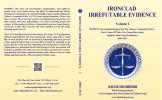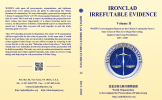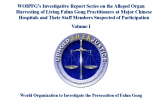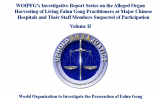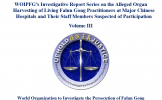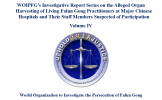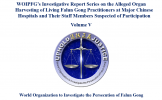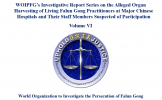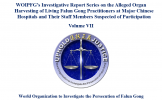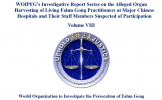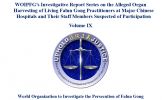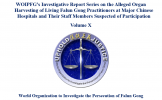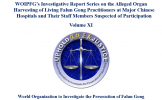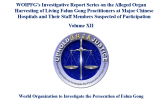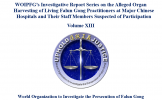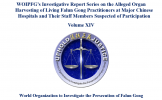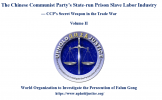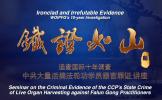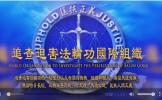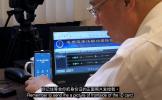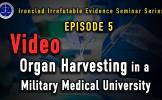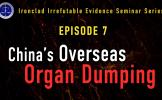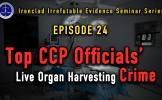Yang Guangting
Summary: Yang Guangting is the chief surgeon of the CCP’s Joint Logistics Support Force Beidaihe Sanatorium and the director of the Kidney Transplantation Center. According to incomplete data, he participated in 510 kidney transplants from 1991 to 2012. The hospital's urology department ranks high in the number of kidney transplants performed in the Beijing Military Region and Hebei Province. The PLA’s No. 281 Hospital simultaneously performed six to nine kidney transplants 28 times from 1991 to 2007. The search for kidney sources and matching were both amazingly fast. The telephone investigation shows that those who were close to the director could have priority in kidney transplants.
In view of the broader background of the Chinese Communist Party's state crime of organ harvesting from living Falun Gong practitioners, since the CCP’s Joint Logistics Support Force Beidaihe Sanatorium (Formerly the CCP’s No. 281 Hospital) has been allegedly involved in the crime, Yang Guangting, the director of the hospital's Kidney Transplantation Center, is a major suspect.
Yang Guangting is the chief surgeon of PLA’s Joint Logistics Support Force Beidaihe Sanatorium and the director of the Kidney Transplant Center. He graduated from the Fourth Military Medical University, is a chief surgeon, a member of the Beijing Military Region Urology Committee, and a standing member of the Qinhuangdao City Urology Committee.
The kidney transplantation department ranks high in the Beijing Military Region and Hebei Province[1]. From 1991 to 2012, he participated in 510 kidney transplants[2].
The Beidaihe Rehabilitation Sanatorium Center of the CCP’s Joint Logistics Support Force is located in Beidaihe District, Qinhuangdao City, Hebei Province, and is affiliated to the Zhengzhou Joint Logistics Support Center. In October 2005, three regiment-level sanitary homes, including Beidaihe Sanatorium of Beijing Military Region of the People's Liberation Army (the PLA’s No. 281 Hospital), Beidaihe Sanatorium of the CCP’s navy, and Beidaihe Sanatorium of the CCP’s air force (the CCP’s No. 178 Hospital,) were integrated into the new Beidaihe sanatorium of the CCP’s Beijing Military Region of the People's Liberation Army, with two clinical departments, and are responsible for the medical and health care support tasks of officers, soldiers, employees and families of units stationed in Qinhuangdao.[3] In 2016, the sanatorium was transferred from the Beijing Military Region to the Zhengzhou Joint Logistics Support Center.[4] It was later called the Beidaihe Sanatorium of the People's Liberation Army of the Communist Party of China. The Beidaihe Rehabilitation and Sanatorium Center of the Joint Logistics Support Force of the People's Liberation Army is an organ transplant medical institution in Hebei Province.[5]
The PLA No. 281 Hospital was part of Beidaihe Sanatorium in Beijing Military Region, which also includes PLA’s No.178 Hospital and Beidaihe Sanatorium of the Navy. The urology department of the hospital carried out kidney transplants, and its number ranked among the top in the Beijing Military Region and Hebei Province.[6]
The PLA No. 281 Hospital had simultaneously performed 6 to 9 cases of kidney transplants for at least 28 times from 1991 to 2007. [7]
Searching for kidney sources and tissue matching were both completed at an astonishing speed. As early as Jan. 28, 2002, the surgeons in Urology department of PLA’s No. 281 Hospital, including Jiang Wei, Yang Guangting, Ma Binggang, Liu Yanbin, Zu Qiang and Zhao Hongqi, carried out 7 cases of cadaveric renal allograft transplants. [8]One recipient was admitted into the hospital on Nov. 13, 2001, received the first surgery of kidney transplant on Jan. 28, 2002. Seven days later, on Feb. 4, 2002, "it is judged the transplanted kidney had artery embolization," and they wanted to do a second transplant surgery. "With active preoperative preparation and contacting for kidney donor, matching appropriate kidneys", they removed the transplanted kidney, and re-transplanted on Feb. 5, 2002. The waiting time for the second surgery was only one day.
So here contacting for a kidney source and doing tissue matching took only one day, namely, Feb. 4. The same process in other countries usually involves a wait of two to three years. This indicated the presence of a large living donor organ bank under the control of the military.
The Telephone investigation shows that those who are close to the director can get priority for kidney transplant
Investigation Respondent: Doctor Pei Xiangke, Kidney Transplant, No. 281 Hospital of Beijing Military Region[9]
Investigation Date: July 4, 2019 (Tel: +86-3355360308)
Summary: 1. Those who are close to doctors and directors can have priority. 2. Question: So, pay more money? Answer: Ah, right, right. That’s the only way. 3. Question: Just the surgery fees? Answer: Approximately over 300,000 rmb yuan. You must have the money ready.
(Recording1 download: MP3; transcript download: pdf 065)
References
[1] 解放军281医院肾移植专家杨广庭 来源:医院官网http://www.pla281.com/zhuanjia.php?btype=%C4%DA%C8%DD%B6%AF%CC%AC&type=…
Yang Guangting, a kidney transplant expert at the PLA 281 Hospital Source: Hospital official website http://www.pla281.com/zhuanjia.php?btype=%C4%DA%C8%DD%B6%AF%CC%AC&type=…
[2]《器官移植》2013年4卷02期 95-97页(英文期刊名:Organ Transplantation)
“肾移植术后红细胞增多症的中西医综合治疗(附82例报告)”作者:刘彦斌、高建、杨广庭、姜伟、禹猛(解放军第281医院泌尿外科,河北秦皇岛,066100);
http://new.med.wanfangdata.com.cn/Paper/Detail?id=PeriodicalPaper_qgyz201302007
Organ Transplantation, Vol. 4, No. 2, 2013, pp. 95-97 (English journal name: Organ Transplantation)
"Comprehensive treatment of polycythemia after renal transplantation with traditional Chinese and Western medicine (with 82 cases report)", Author: Liu Yanbin, Gao Jian, Yang Guangting, Jiang Wei, Yu Meng (Department of Urology, 281st Hospital of PLA, Qinhuangdao, Hebei, 066100);
http://new.med.wanfangdata.com.cn/Paper/Detail?id=PeriodicalPaper_qgyz2…
[3] 中国人民解放军联勤保障部队北戴河康复疗养中心
[4] 中国人民解放军联勤保障部队北戴河康复疗养中心
[5] 中国人民解放军联勤保障部队北戴河康复疗养中心
[6] Introduction of PLA 281 Hospital. Retrieved from http://www.pla281.com/about.php
WOIPFG Archived Link:
http://www.zhuichaguoji.org/cn/images/medicalarticles/131.png
[7]Qiao Shufang & Zhang Jiyun. (2008). Organization and management of bulk allograft kidney transplant surgeries for 313 cases. Chinese Journal of Convalescent Medicine[J]. pp. 8-9, Vol. 17, Issue 01
WOIPFG Archived Link:
http://www.zhuichaguoji.org/cn/images/medicalarticles/128.pdf
[8]Jiang Wei, Yang Guangting, Ma Binggang, Liu Yanbin, Zu Qiang, Zhao Hongqi. (2004). Report on two cases of transplant kidney artery embolization. Medical Journal of National Defending Forces in North China.[J]. pp.41, Issue 01, Vol.16
WOIPFG Archived link:
http://www.zhuichaguoji.org/cn/images/medicalarticles/130.pdf
[9] 《2019年追查国际对中共活摘法轮功学员器官现状调查综述》http://www.zhuichaguoji.org/node/125981


